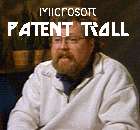

THE biggest patent troll in the world came from Microsoft and it is extorting some more large companies. Then it covers things up. "This article is by Kenneth Lustig, the vice president and head of strategic acquisitions at Intellectual Ventures, an invention and patent firm that helps clients bridge the gap between the rights they own and the rights they need," says the opening of this piece. What utter nonsense. In this passage, "patent firm" means "patent troll".
After years of not suing anyone (but always threatening that it might, someday), Intellectual Ventures has become more and more aggressive of late in suing lots of companies. A few weeks ago it sued AT&T, Sprint and T-Mobile over a bunch of patents that (of course) involved some of IV's favorite shell companies. Just as it was preparing this lawsuit, a VP from IV went public with an attempt to argue that all this litigation is a sign of innovation at work. The article is rather shocking in how it presents its argument. It mainly relies on false claims that correlation means causation, concerning historical periods of innovation and lawsuits over patents. Of course, what it ignores is that the patent fights often come right after the innovation, not before. In other words, the patent battles aren't a sign that innovation is working. Rather it's a sign of patent holders freaking out that others are innovating. It's entirely about hindering innovation, not helping move it forward.
Over the last few years, wide swathes of the game industry, and the downloadable app industry in general, have been revolutionized by a single idea: letting people play for free while charging some of those players for in-game items. Now, it seems, a shell company is claiming that it has sole ownership of that idea, and is going to court to stop a wide range of game companies from using it.
John Wiley, Physicists Sue Patent Lawyers Over Journals
In a sign the country’s intellectual property laws may be getting out of hand, copyright lawyers are suing patent lawyers for using scientific journals to prepare patent applications.
In lawsuits filed this week, publisher John Wiley & Sons and the American Institute of Physicists claimed that lawyers and their firms in Chicago and Minnesota wrongfully copied journal articles.